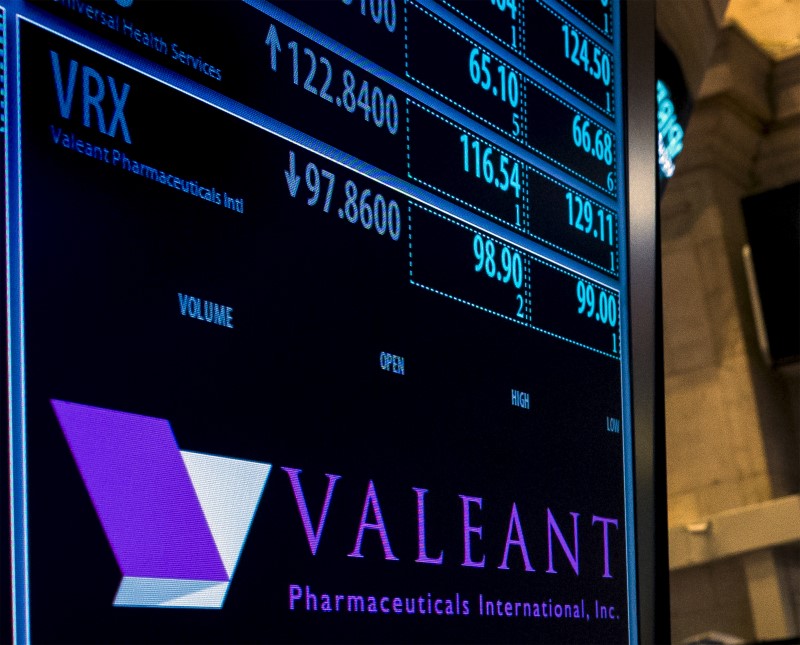By Caroline Humer and Svea Herbst-Bayliss
NEW YORK/BOSTON (Reuters) - Valeant Pharmaceuticals International Inc (TO:VRX) (N:VRX) shares fell as much as 20 percent on Thursday to a level not seen since 2013, heaping new pressure on Chief Executive Officer Michael Pearson (L:PSON) after weeks of steep losses due to concerns about the drugmaker's business practices.
The stock has plunged from $263.70 on Aug. 5 to below $80 on Thursday on scrutiny over high price markups for its drugs and accusations it used a specialty pharmacy, Philidor Rx Services, to inflate revenue. Valeant has denied the allegations, but has not allayed investor concerns as new reports surface of questionable billing practices at Philidor.
One new trigger for selling, said BMO analyst Alex Arfaei, may be a Wall Street Journal article on Thursday in which major Valeant investor Bill Ackman, of hedge fund Pershing Square Capital Management, told a Valeant board member that Pearson may have to go.
Ackman's firm and its investors have lost roughly $2.3 billion from their 6 percent stake in Valeant since the bet was made early in the year. The size of Ackman's fund has shrunk to roughly $14.5 billion from $20 billion earlier in the year as Valeant, his biggest bet, has soured.
Later Thursday, Ackman in an email to Pearson, seen by Reuters, expressed confidence in the CEO's leadership and willingness to take steps in the best interest of investors.
"You are one of the most shareholder-oriented CEOs I know," Ackman wrote to Pearson. "You have assured me that you and the rest of the board are considering any and all alternatives that would benefit shareholders and other stakeholders."
A Valeant spokeswoman said Pearson retained the full confidence of the company's board of directors. "Mike remains focused on running the business and has been meeting with physicians, partners and other stakeholders," Laurie Little said.
The comments did not halt the slide in U.S.-traded shares, off 15 percent to $78.27 on Thursday after hitting a bottom of $73.37 earlier in the session, the lowest since May 2013.
The latest selloff is pushing longer-term investors who bought stock more than two years ago into the red. Tiger Ratan Capital Management, a smaller hedge fund, invested in Valeant 2-1/2 years ago and had 22 percent of its assets in the stock at the end of the second quarter.
One large investor in Valeant who declined to be identified said Pearson is still the right man to be CEO. "Why would you force out the guy who knows this operation better than anyone else in the middle of this crisis?" he said.
STEEP LOSSES
Pearson, who grew up in Canada, took over at Valeant in 2008 after working as a pharmaceutical industry consultant at McKinsey & Co. He drove up Valeant's revenue sevenfold, mainly through a quick succession of acquisitions, including Salix Pharmaceuticals and Bausch + Lomb.
Pearson has been widely criticized for eliminating jobs and cutting research and development for quick returns at companies that Valeant buys. The company is being investigated by prosecutors in New York and Massachusetts and been summoned to testify to Congress over its steep drug prices increases.
But the steepest stock slide was precipitated by a report from influential short-seller Citron Research on Oct. 21, claiming the company was using an undisclosed relationship with Philidor to inflate revenue. Valeant has since cut off ties with the firm and said it was investigating its practices.
"They really possess very little in redeeming qualities in the eyes of the public," said Peter Mann, portfolio manager at Gluskin Sheff + Associates, which sold its small Valeant position in September. "The market overall has probably reached its saturation point" with Valeant.
Mutual fund managers, in particular, are feeling the pressure to tell clients and their own management they have steered clear of Valeant, something that is exacerbating the selling pressure.
Weitz Investment Management said on Nov. 2 on its website that it had exited its Valeant positions. Hedge fund Blue Mountain said it got out of the position in October but did not rule out getting back in. While Blue Mountain did not name Valeant in its letter, a source confirmed it was the drugmaker. Hedge fund Jana Partners has also exited Valeant.
Other Valeant investors who bought the stock in 2013, including hedge funds Arrow Capital Management, Antipodean Advisors, Meru Capital and Hoplite Capital, would be feeling pain if they still hold the stock. Other big investors, including ValueAct and Viking Global Investors, have been with Valeant for longer and may still be sitting on gains.
Valeant short-sellers, however, are benefiting for now. John Hempton of Bronte Capital told Reuters he has increased the firm's short position "many times on the way down, all at prices over $100." Hempton was among the first investors to raise red flags on Valeant's business relationship with Philidor.
Activity in puts betting on the shares dropping as low as $45 in the coming months suggested some investors were loading up on disaster insurance.
On Thursday, options volume on Valeant surged to 237,000 contracts, or 3.4 times the daily average, with heavy trading in puts that protect against declines in the shares.
Even so, bond traders have not written off Valeant. Valeant bonds dropped by as much as 4 points in early trading on Thursday before paring back nearly half of those losses.

"There is a view that Valeant has a core group of businesses that should provide support relative to their existing debt obligations," said Jon Duensing, deputy chief investment officer at Amundi Smith Breeden.